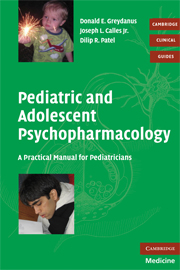Book contents
- Frontmatter
- Contents
- Contributors
- Foreword by Christopher K. Varley
- Foreword by Renée R. Jenkins
- Preface
- Acknowledgement
- 1 Principles of psychological management
- 2 The basics of pharmacology and neurotransmission
- 3 Basics of prescribing psychopharmacologic agents
- 4 Anxiety disorders
- 5 Attention deficit/hyperactivity disorder
- 6 Child and adolescent depression
- 7 Disruptive behavior and aggressive disorders
- 8 Schizophrenia in childhood and adolescence
- 9 Autism spectrum disorders
- 10 Psychotropic management of children and adolescents with cognitive–adaptive disabilities
- 11 Sleep disorders in children and adolescents
- 12 Tic disorders in children and adolescents
- 13 Substance abuse disorders
- Subject index
- References
1 - Principles of psychological management
Published online by Cambridge University Press: 18 December 2009
- Frontmatter
- Contents
- Contributors
- Foreword by Christopher K. Varley
- Foreword by Renée R. Jenkins
- Preface
- Acknowledgement
- 1 Principles of psychological management
- 2 The basics of pharmacology and neurotransmission
- 3 Basics of prescribing psychopharmacologic agents
- 4 Anxiety disorders
- 5 Attention deficit/hyperactivity disorder
- 6 Child and adolescent depression
- 7 Disruptive behavior and aggressive disorders
- 8 Schizophrenia in childhood and adolescence
- 9 Autism spectrum disorders
- 10 Psychotropic management of children and adolescents with cognitive–adaptive disabilities
- 11 Sleep disorders in children and adolescents
- 12 Tic disorders in children and adolescents
- 13 Substance abuse disorders
- Subject index
- References
Summary
Introduction
Physicians are often taught that pharmacological treatments are the most effective and least expensive methods of treating mental disorders. While it is true that the parents of youth who receive mental health services often have to bear a greater share of the financial burden, that burden exists because insurance companies often do not treat medical and mental illnesses with parity. Additionally, access to trained child and adolescent therapists is limited for several reasons: (a) limited numbers of clinicians are trained to deal specifically with child and adolescent issues, especially with those youth who have severe mental disorders (e.g. schizophrenia) or a combination of mental disorders and developmental disabilities, neurological disorders, or serious medical disorders; (b) many managed care panels limit the numbers of mental health clinicians they will add to their provider panels, which means that providers cannot be reimbursed for service delivery if they treat patients covered by those insurance companies; and, (c) low reimbursement rates for psychologists and social workers result in clinicians refusing to accept specific types of insurances, shifting the burden of cost to the patient's parents.
Other obstacles to referring a patient to receive psychological and psychosocial treatment include: (a) the fact that when parents and youth are in psychological distress, they want immediate relief, but psychotherapy is a time-consuming process; (b) some treatment interventions with positive outcomes often take longer to be effective than some medications do; (c) the whole family (especially parents) must devote time, energy, and effort to implementing treatment intervention; (d) youth must be transported to the treating clinician, the process of which can be disruptive to the family routine; and, (e) parents are expected to change their behaviors to support their child's treatment gains.
- Type
- Chapter
- Information
- Pediatric and Adolescent PsychopharmacologyA Practical Manual for Pediatricians, pp. 1 - 24Publisher: Cambridge University PressPrint publication year: 2008
References
- 1
- Cited by

